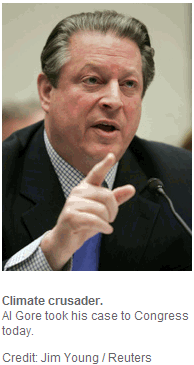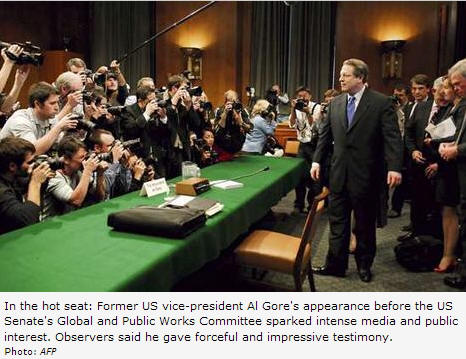|
|
|
|
|
|
|
News & Views item - March 2007 |
![]() The Goracle Fronts the US Congress and Struts the World Stage. (March 22,
2007)
The Goracle Fronts the US Congress and Struts the World Stage. (March 22,
2007)
 According
to The New York Times' Felicity Barrington and Andrew Revkin, "It was
part science class, part policy wonk heaven, part politics and all theater as
former Vice President Al Gore came to Congress today to insist that global
warming constitutes a "planetary emergency” requiring an aggressive federal
response."
According
to The New York Times' Felicity Barrington and Andrew Revkin, "It was
part science class, part policy wonk heaven, part politics and all theater as
former Vice President Al Gore came to Congress today to insist that global
warming constitutes a "planetary emergency” requiring an aggressive federal
response."
He told a joint meeting of two House of Representatives' subcommittees in the morning and a Senate hearing after lunch that anthropogenic climate change was the world's most severe threat and meaningful cuts in emissions linked to warming will only happen if the United States takes the lead.
The Times' reporters found the atmosphere during Mr Gore's address to the "Reps" to be more that of a college lecture hall than that of a subcommittee hearing, where thrust and parry are usually the order of the day.
But it wasn't all sweetness and light: "We need to be careful when we talk about
so-called scientific facts," said Representative Joe Barton (R-TX). He then
presented historical evidence to refute Gore's assertion that carbon dioxide
concentrations preceded temperature rises. "On this point, Mr. Vice President,
you're not just off a little. You're totally wrong."
Gore wasn't having any of it and shot back that scientific consensus on climate
change was behind him, and that the government must act quickly. "The planet has
a fever, if your baby has a fever, you go to the doctor. If the doctor says you
need to intervene here, you don't say, 'Well, I read a science fiction novel
that told me it's not a problem.'"
Congressman Barton also criticized Gore's recommendations on freezing carbon
dioxide emissions. "If we took that literally, we can add no new industry, no
new cars on the street, and apparently no new people. Every person emits 0.2
tons of carbon dioxide a year." Others in Congress expressed concern that the
United States' fight on global warming would be moot if some of the other large
contributors, such as China and India, don't reduce pollution. Some suggested
more investment in nuclear power as a "clean" energy source.
Once before the Senate subcommittee things were also lively.
Oklahoma Senator James Inhofe, the ranking Republican member of the Environment
and Public Works Committee: “It is my perspective that your global warming
alarmist pronouncements are now and have always been filled with inaccuracies
and misleading statements,” and estimated the cost of proposals to reduce
emission of heat-trapping gases at US$300 billion, "The poor pay for it and the
science isn’t there. We just can’t do that to America, Mr. Vice President. And
we’re not going to."
always been filled with inaccuracies
and misleading statements,” and estimated the cost of proposals to reduce
emission of heat-trapping gases at US$300 billion, "The poor pay for it and the
science isn’t there. We just can’t do that to America, Mr. Vice President. And
we’re not going to."
Senator Christopher Bond, Republican of Missouri, then raised the question of whether sunspots are the cause of global warming and argued that the carbon-controlling legislation favoured by many Democrats would send his poor constituents' heating bills up 80 percent.
Mr Gore rubbished the sunspot explanation and "With his command of the science of climate change... took on a professorial air... but it was touched with a preacher’s fire as he urged action."
And Science's John Simpson noted, "Gore diverged from his talking points
to offer his thoughts on how to deal with what he called "the most serious
[crisis] we've ever faced." Among his recommendations were an immediate cap on
carbon dioxide emissions; by 2050, Gore said he would like to see a 90%
reduction of carbon dioxide levels. Gore also called for a change to the Kyoto
Protocol that would move up a national reduction of greenhouse gases from 2012
to 2010, and he suggested a moratorium be placed upon coal-fired power plants
without capture and sequester technology. Finally, he recommended development of
an "electranet," a smart grid for alternate energy sources.
And of course the question of Mr Gore entering the race for the Democratic nomination for US President came up more than once during his Washington sojourn.
Once again he demurred but didn't give the unequivocal Shermanesque reply: "If nominated I will not run; if elected I will not serve."*
*William Tecumseh Sherman was one of Abraham Lincoln's ablest (and one of his most ruthless) generals during the American Civil War.